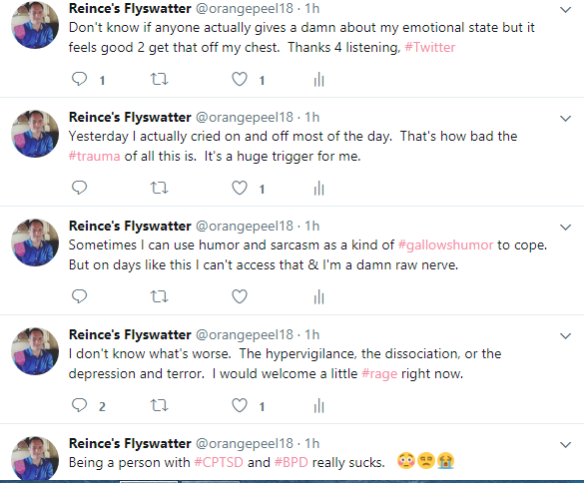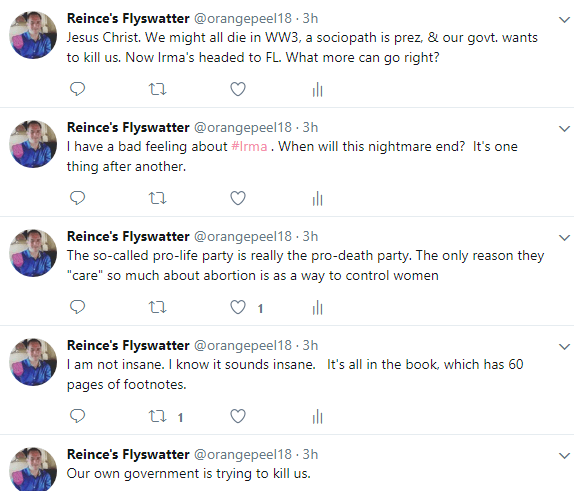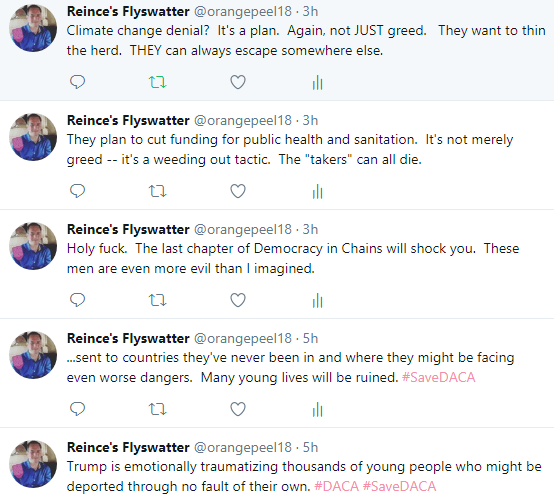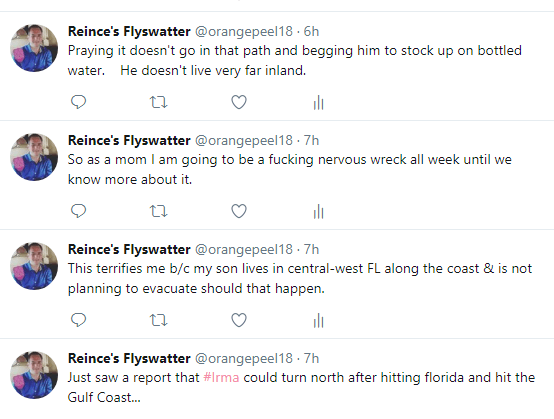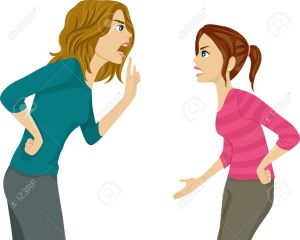
Yes, another potentially controversial post. Please hear me out before judging.
There are some (actually, many) people in the blogosphere who believe that people with disorders like Borderline or Narcissistic Personality Disorder made some kind of conscious choice to have their disorder. With unusual exceptions (which I’ve discussed in others posts), I think this is wrong.
Bad seeds?
People with Cluster B disorders, in spite of what you probably read or heard, aren’t inherently evil or “bad seeds.” Certainly, some become evil, because they’ve been programmed for a psychological need to obtain narcissistic supply in order to feel like they exist. In order to get that supply, they became abusive and manipulative. People addicted to drugs or alcohol are also abusive and manipulative, in order to get their chemical fix.
People with psychopathy may have been born without the brain capacity to feel empathy or have a conscience, but I don’t think Psychopathy should even be categorized as a Cluster B disorder at all, since it seems to have its roots more in brain chemistry than in early trauma. Plenty of psychopaths came from normal, loving families. The jury’s out as to whether Antisocial Personality Disorder is the same thing as psychopathy. I think they may coincide often and their symptoms are similar, but I’m not at all sure they’re the same thing. I don’t know a whole lot about ASPD, but I think it, too, usually has its roots in trauma as a child. I know almost nothing about its treatability, but it’s my understanding it’s very difficult to treat, even more so than NPD. But I digress: talking about ASPD or psychopathy is not the point of this post.
Another blogger who commented on a post of mine today mentioned that she may have undiagnosed, recovered BPD. I sensed from the tone of her admission that this might be something she’s ashamed to admit. I wondered why. BPD, like NPD, has a terrible stigma, although in its favor, there’s a movement in the BPD community to reduce its stigma as “evil” and “incurable.” Their efforts seem to be working, because BPD is seen today as being less of a “mark of the beast” than NPD is, although the stigma certainly still exists.
Why no anti-stigma movement for NPD?
I’m not sure why there is no grass-roots movement among narcissists to change the stigma against NPD, but from everything I’ve read from self-aware narcissists (and you’d be surprised how many of them there are online), they’re either: (a) proud that they are narcissists and wear the “evil” stigma like a badge of honor (these tend to be malignant, overt narcissists with antisocial or sociopathic traits), or (b) *this is a shocker* so ashamed of their narcissism that although they hate the stigma, they seem resigned to it and and seem to hang their heads in shame, quietly accepting how “bad” they are. “I deserve it,” they say. It may seem hard to believe, but some of them even defend the narc-haters. Remember we are talking about self-aware narcissists. Most narcs never get to that point. Their grandiosity keeps them from having enough insight to do that.
Ego-dystonic vs. ego-syntonic.
Because people with BPD are almost always ego-dystonic about their disorder (they aren’t happy with themselves), and because generally BPD doesn’t lend itself to self-delusions (in other words, having a false self) the way NPD does, BPD has a higher cure rate than NPD, which also helps reduce its stigma. NPD is usually more ego-syntonic, but not always. Narcissists who are ego-dystonic (usually covert narcissists) tend to be frustrated, lonely, and depressed, and although they can be highly manipulative, entitled acting, and lack empathy, they lack the grandiosity and false pride that keeps them stuck in the delusion that their narcissism has worked for them.
I don’t see a whole lot of difference between BPD and C-PTSD. Actually, BPD is like C-PTSD on steroids. I’ve written about this subject before–the symptoms of both are nearly identical, and both Borderlines and people with C-PTSD are very prone to become codependent to malignant or overt narcissists. They are also prone to self-harm, wild mood swings, and are sometimes suicide risks. People with C-PTSD–especially women–often get slapped with the stigmatizing BPD label simply because the DSM doesn’t recognize C-PTSD as a legitimate disorder (and PTSD, while similar, applies more to those who suffered a single, intense trauma rather than the victims of chronic, long term abuse starting in childhood, so the treatments for someone with PTSD would be different).
Moving back to narcissism…
Many people believe NPD cannot be successfully treated, much less cured. I admit I’m skeptical about its curability, though I do know there have been a few cases where it’s happened. I also know there are narcissists who are ego-dystonic and unhappy with what they’ve become, once they realize they are narcissists. I don’t think the adage that “if you think you have NPD, then you don’t” is necessarily true. I have met a few here and on forums who desperately want to change their behaviors, usually because they’ve realized that they’ve missed out on things like knowing how to love and receive love, or having a healthy relationship with their spouse or children. They want to know what love and vulnerability in a relationship feels like. They want to know what real joy and empathy feels like. They forgot how. They’ve come to realize their lives are empty and shallow, and they are constantly under the stress of always having to act a part in a play. They forgot who they were a long time ago. Most narcissists did not have happy childhoods and most had parents who either abused or spoiled them (spoiling is a form of abuse because it fails to mirror who the child actually is, so the “love” they get is conditional).
As a mental illness.
I’m in no way defending narcissists or the way they act. But as a cluster B disorder, it started as a defense mechanism to cope with unbearable pain and feelings of emptiness. Many people believe narcissists love themselves, but nothing could be further from the truth. They only love their false self. Scratch any narcissist and you find a person who doesn’t even know who they are. BPD is much the same that way, except Borderlines don’t have a functional or strong false self. I’m not suggesting sympathizing with active, unrepentant narcissists or condoning their toxic behaviors. I’m not suggesting staying with one either! But I think the stigma against NPD has hurt those people with the disorder who sincerely want to change. These people do exist! I don’t think they’re lying when they say they want to become non-narcissists–why would they? What would be their motive in doing so? Much as with people with BPD, therapists refuse to treat them, insurance won’t cover them, and they are frequently demonized as non-human creatures or worse.
Maybe the treatment rate for NPD is so abysmal because they are given up on so easily by therapists who lose patience with someone who doesn’t show immediate improvement or acts aggressively or in a confrontational way. NPD is a very difficult disorder to treat, but that doesn’t mean it isn’t possible. Even if a narcissist can’t be cured, CBT and other mindfulness therapies have had good results on some narcissists who really want to change the way they treat others and have more mutually fulfilling relationships. DBT (dialectical behavioral training), a mindfulness therapy similar to CBT traditionally used on people with BPD, has also been shown to be effective on some people with NPD.
As a Borderline myself (my therapist thinks I’m recovered, but I’m not at all sure about that), and having personally experienced the stigma against Cluster B, I have a great deal of empathy for anyone with a Cluster B disorder who is self aware and genuinely sorry about the way they’ve treated others or the choices they’ve made, and who sincerely wants to do the hard work needed to make changes in themselves. People with Cluster B disorders didn’t choose to become that way; like people with C-PTSD, they have a mental illness caused by trauma and C-PTSD is almost always at the core of any cluster B disorder.
While it’s true that some will never get to the point of self awareness or even if they do, may not be interested in finding new and better ways of relating to others and the world, there are many who do, and we shouldn’t judge them or hate them just because of their stigmatic diagnosis (and the diagnosis could be wrong anyway!). That’s why I don’t run a “narc free” blog. I allow people with Cluster B diagnoses–including NPD–to post comments on this blog and share their experiences along with others who do not have those disorders and were abused by people who do. As long as they don’t attempt to upset or trigger non-Cluster B abuse victims and remain civil and add to the conversation, they are always welcome here.

